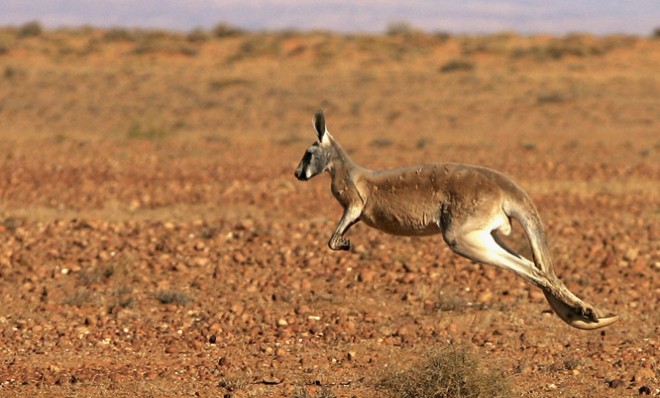12 animal adjectives to bolster your vocabulary
Watch out for mephitine odors and musteline villains

A free daily email with the biggest news stories of the day – and the best features from TheWeek.com
You are now subscribed
Your newsletter sign-up was successful

In eighth grade, when I read that Julius Caesar had an aquiline nose, I mistakenly thought it had something to do with water. But aquiline is from Latin aquila, meaning eagle, not aqua, water. He had a curved, beaklike nose, not a runny one.
You know some other animal adjectives ending in -ine: feline (catlike), canine (doggy), and bovine (cow like). How many more are there? A herd, a flock, a whole bunch. Here's a dozen.
1. ANGUINE
The Week
Escape your echo chamber. Get the facts behind the news, plus analysis from multiple perspectives.

Sign up for The Week's Free Newsletters
From our morning news briefing to a weekly Good News Newsletter, get the best of The Week delivered directly to your inbox.
From our morning news briefing to a weekly Good News Newsletter, get the best of The Week delivered directly to your inbox.
Joseph Sheridan Le Faun managed to use the erudite term in The Tenants of Malory. "Her beautiful eyebrows wore that anguine curve, which is the only approach to a scowl which painters accord to angels." The word means snakelike, from Latin anguis, snake.
2. BUTEONINE
Here's a perfect description of a hostile-take-over artist: buteonine, resembling a buzzard (from Latin būteōn-em, hawk or buzzard).
3. DELPHINE
A free daily email with the biggest news stories of the day – and the best features from TheWeek.com
Delphine is an obsolete adjective referring to the dolphin (from Old French dauphin, from Provençal dalfin, from Latin delphinus, from Greek delphin).
4. DIDELPHINE
Didelphine does not refer to a double dolphin, but a double uterus. It's a variant of didelphian (from modern Latin Didelphia, from Greek di-, twice + delphos, womb) and refers to a subclass of marsupials including opossums.
5. HIPPOCAMPINE
If your hippocampi are functioning properly, you may remember that hippocampus refers to the elongated ridges on the floor of each lateral ventricle of the brain that play a central role in memory. The hippocampi are named for their resemblance to seahorses (from late Latin, from Greek hippokampos, from hippos 'horse' + kampos 'sea monster').
Hippocampus, or seahorse, originally referred to mythological creatures having two forefeet, and a body ending in the tail of a dolphin or fish, represented as drawing the carriage of Neptune. Now both terms refer to a genus of small fishes you sometimes see in aquariums. Oh, and "hippocampine" is a rarely used adjective relating to seahorses.
6. LIMACINE
If you want to call someone sluggish (or worse, slimy) in a more elegant fashion, you could call them limacine, meaning "of, relating to, or resembling a slug; akin to līmus, slime."
7. MACROPODINE
If you have a smattering of Latin or Greek, you can guess, correctly, that the stem "macropod-" means "big foot," but macropodine refers not to Sasquatch, but to kangaroos or wallabies.
8. MEPHITINE
If you'd like to say, ever so discreetly, that something stinks, you could say it's mephitine, or skunk-like. The word seems to have been coined from mephitis (from classical Latin mefītis, mephītis an exhalation of sulfurated water or gas, also personified, as the name of the goddess of exhalations), but it doesn't appear in standard dictionaries or even in Google Books.
9. MURINE
This adjective has nothing to do with eye drops. It means relating to a mouse or mice (from Latin murinus, from mus, mur- "mouse.")
10. MUSTELINE
If people are sneaky, you might describe them as musteline, or weasely. The word originates from classical Latin mustēlīnus, of or belonging to a weasel, and from mustēla (also mustella) weasel, of uncertain origin (perhaps related to mūs, mouse).
11. PHOCINE
A graceful swimmer might be called phocine, which means resembling a seal, from the genus name phoca, from classical Latin phōca, or seal.
12. PICINE
Picine, meaning like a woodpecker (from the genus name assigned by Linnaeus, from classical Latin pīcus, woodpecker) is not to be confused with piscine, of or relating to fishes.
More from Mental Floss...
-
 Political cartoons for February 15
Political cartoons for February 15Cartoons Sunday's political cartoons include political ventriloquism, Europe in the middle, and more
-
 The broken water companies failing England and Wales
The broken water companies failing England and WalesExplainer With rising bills, deteriorating river health and a lack of investment, regulators face an uphill battle to stabilise the industry
-
 A thrilling foodie city in northern Japan
A thrilling foodie city in northern JapanThe Week Recommends The food scene here is ‘unspoilt’ and ‘fun’